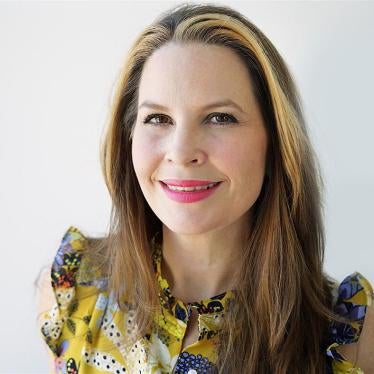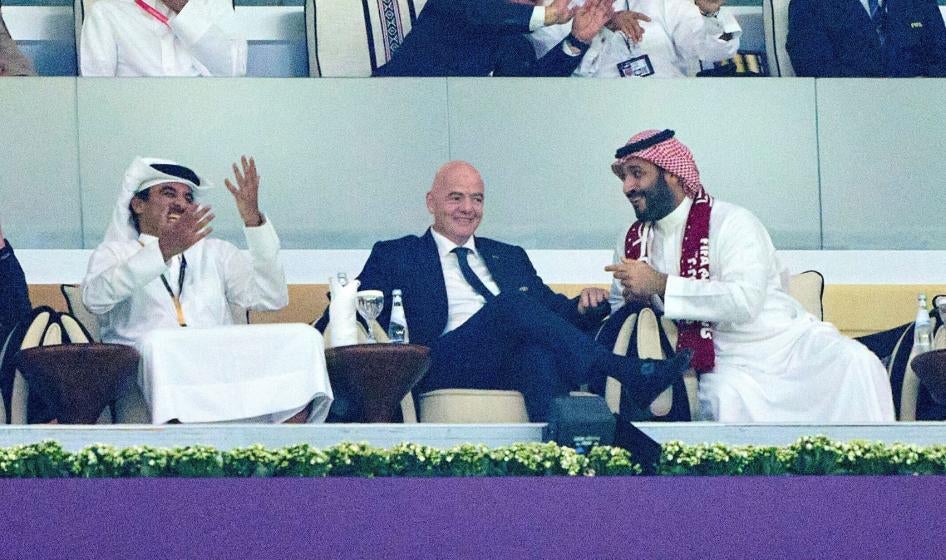FIFA’s decision to award Saudi Arabia’s state tourism authority sponsorship of the 2023 Women’s World Cup shows shocking disregard for suffering and repression of Saudi’s courageous women’s rights defenders. It points to the need for FIFA, soccer’s global governing body, finally to carry out its promised human rights due diligence on the impact of its decisions and to enforce its own human rights and non-discrimination policies across all FIFA operations—including future World Cup hosts and sponsorships.
The Women’s World Cup is the every-four-years flagship event in women’s soccer—and with more than a billion viewers, the most watched global women’s sport event. Top female athletes worldwide train their entire professional careers to play, and for many it is the apex of their careers. As a sponsoring company, the Saudi state tourism campaign will be shown throughout women’s games, on the jumbotron, in stadiums and blanketing game-time television with advertisements.
Saudi Arabia, of course, is a global outlier on human rights—and especially women’s rights. As recently as 2018, women and girls were still barred from taking part in sport in schools or even watching sports in stadiums. Over the past decade, Saudi women fought for and won some reforms. For example, they can now drive and travel abroad without permission of male guardians.
However, many women’s rights activists were imprisoned just as the authorities enacted the reforms they had advocated, the government continues to ban women’s rights activists from travelling abroad, and courts have imposed harsh sentences to silence criticism. Last August, Saudi Arabia sentenced Salma Al-Shehab, a Saudi doctoral student in the UK to 34 years in prison—based solely on her use of Twitter.
Saudi Arabia has not fully dismantled the “male guardianship" system, and instead in 2022 passed the first Personal Status Law that codifies male guardianship. The law requires women to obtain permission from a male guardian—their father, brother, uncle or grandfather—to marry and they must “obey” husbands. Saudi authorities still require women to obtain male guardian permission to leave prison or obtain some forms of sexual and reproductive health care. Husbands reportedly can prevent a woman from seeking higher education abroad.
Saudi authorities also repress the rights of lesbian, gay, bisexual, and transgender (LGBT) people, and have eliminated discussion around gender and sexuality from the public sphere, including online. In 2020, a Saudi court convicted a Yemeni blogger living in Riyadh as an undocumented migrant, because he posted a video on Twitter saying, “LGBT people deserve rights.” He was charged with promoting homosexuality online and “imitating women,” and sentenced to 10 months in prison, where security officers held him in solitary confinement for weeks, subjected him to a forced anal exam, and repeatedly beat him to compel him to confess he is gay.
LGBT people in Saudi Arabia practice extreme self-censorship to survive their daily lives. LGBT players and fans visiting Saudi will also likely face censorship, stigma, and discrimination on the basis on their sexual orientation and gender identity.
So long as Saudi Arabia discriminates against LGBT people and punishes women for their rights activism or their otherwise peaceful exercise of freedom of expression, FIFA should not be allowing Saudi authorities to use the most-watched women’s sport event to sportswash its rights abuses.
Human Rights Watch contacted FIFA to request details on the soccer governing body’s human rights due diligence and stakeholder consultation for selection of World Cup hosts and awarding commercial sponsorship contracts. FIFA has not responded.
As the former Australia Women’s National Soccer team vice-captain Moya Dodd told Human Rights Watch: “There will be many LGBT players and fans at the Women’s World Cup who find soccer a place where they can belong and fully express themselves. The safe and inclusive vibe of women’s soccer is really precious, and part of the zeitgeist of women’s sport.” With respect to FIFA’s plans for Saudi state sponsorship, she said: “It’s hard to see how this could pass responsible business principles, let alone meet FIFA’s own human rights obligations and policies.”
Female players and officials from Australia and New Zealand were reportedly not consulted prior to FIFA’s decision to make Saudi Arabia’s state tourism authority a marquee partner for the tournament. FIFA and Qatari authorities have yet to compensate migrant workers for the abuses they faced delivering the Qatar Men’s 2022 World Cup, and sponsors are tarnished by association for that failure.
Saudi Arabia’s ambitions around major sporting events are clearly expanding beyond sponsorships: Politico broke news this week that Saudi Arabia offered to pay for billions in stadium and other infrastructure costs for Greece and Egypt in a joint bid to host the 2030 Men’s World Cup—more evidence of the government’s strategy to “sportswash” its poor human rights record by hosting beloved sporting events.
Saudi authorities could better make their case to promote their record by reforming abysmal human rights policies and practices that discriminate and punish women, human rights defenders, LGBT people, migrant workers and religious minorities.
FIFA should reverse its decision to include the Saudi state authority as a sponsor. The Women's World Cup is a festival of soccer and a celebration of the skill and diversity within the women's game—not an opportunity to launder the reputation of a government that violates women's rights.










